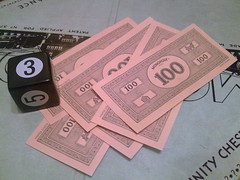Despite the economic downturn, sales of guns and ammunition are growing in various parts of the country. This is the topic of the latest post on Patchwork Nation, a survey of how different types of communities are coping with the economic downturn. This morning, I chatted online with Dante Chinni, director of the Patchwork Nation project, about his findings:
Laura Hertzfeld: What made you think to look at weapons as an area that might be booming?
 Dante Chinni: Well, I’d been looking at these stories about gun makers recently. I knew from my travels to some of my communities that the gun run was a real story. People were telling me they couldn’t find ammo. So I thought, let’s see where the gun stores are located. Sure enough we found an interesting correlation.
Dante Chinni: Well, I’d been looking at these stories about gun makers recently. I knew from my travels to some of my communities that the gun run was a real story. People were telling me they couldn’t find ammo. So I thought, let’s see where the gun stores are located. Sure enough we found an interesting correlation.
LH: Are those communities also places where other types of manufacturing have suffered recently? Are people who’ve been displaced from other jobs getting jobs in the weapons industry?
DC: The question I was wondering was who’s driving the gun boom. You can’t get numbers from the FBI on applications, but you can see where the stores are located. That’s what we have here, a look at who has the most gun stores nearby.
LH: Are there any areas of the country that surprised you — opening gun stores where there weren’t as many before?
DC: It reveals culture I think. It’s about the economy and politics. Well, to be clear, these aren’t openings, these are locations. It wasn’t completely shocking to me that there are more guns stores in places where you can go hunting in some field 10 minutes away than there are in, say, the West Village [in New York City]. There are just so many more stores per capita in rural agricultural locales. It’s 10 to 1.
LH: Well, of course, but do you think there’s a fear that didn’t exist before? Both a fear — needing to protect and a fear that gun laws will be tightened.
DC: The fear is real. And the fear is way more about the worries that the feds are coming to tighten the gun and ammo supply. I don’t think these are people preparing for Armageddon. But they are preparing for new controls on the weapons and ammo they can own.
LH: Has there been any backlash on this from the antigun lobby? Are they noticing this trend, too? When you started talking to people in the patchwork communities about this, how did they respond?
DC: Well, first let’s note that there have been no signs a tightening is coming from the government. But I have not looked closely at the anti-gun lobby yet. I would assume that like many camps in the Obama fold they may think the president is moving too slowly.
LH: It seems like there are so many other pressing things economy-wise on the president’s agenda — not so surprising that guns haven’t come up.
DC: True on that point. In the communities, they mention the gun sales as validation: “See I told you people are scared.” But they actually take comfort in it. I guess the idea that others feel as they do.
LH: At the end of your post you say this is more of a local than national phenomenon — but are the gun-friendly areas growing?
DC: That we will have to see with time. I think we want to look at some survey data on that and see how it falls into our 12 community types. But, my gut reaction is no. This is more about the amount of anger and fear about the Obama Administration than it is a select group of communities in the United States.
